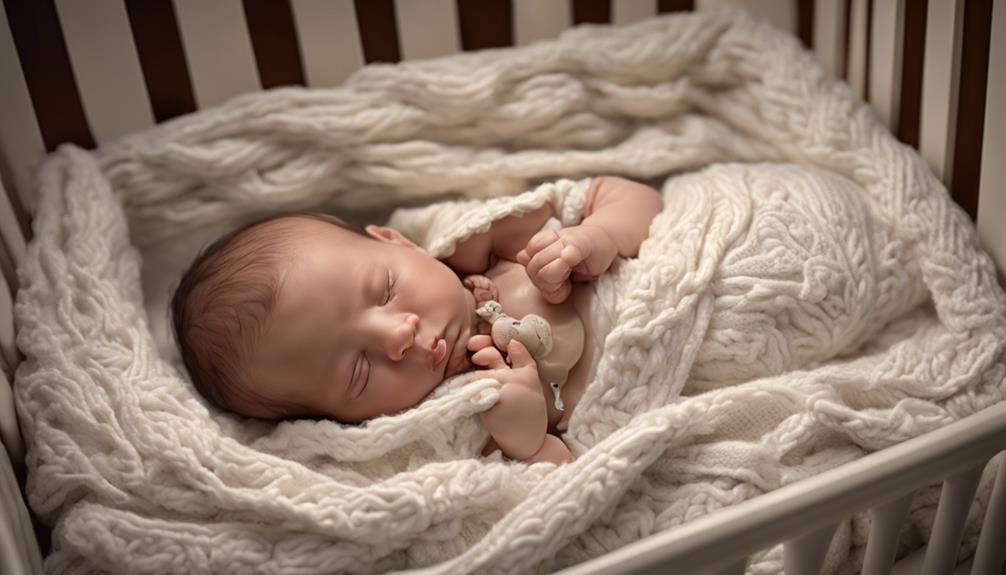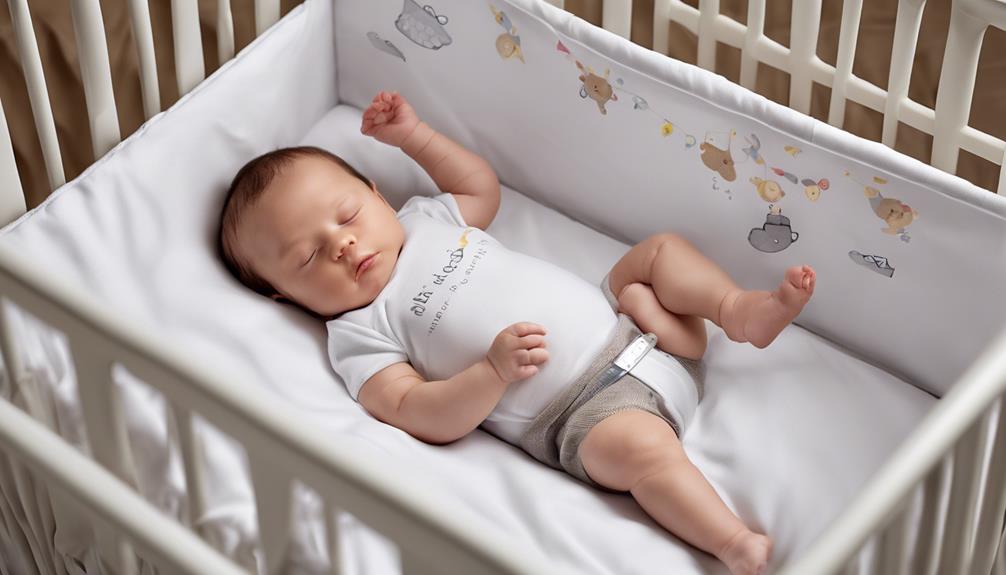As parents, we are all familiar with the challenge of managing newborn spit-up during sleep—it can seem like an ongoing struggle. But do not worry, there are practical tips to reduce these occurrences and ensure your baby sleeps soundly through the night.
By understanding the underlying causes and making simple adjustments to feeding positions and sleep environments, you can greatly reduce the chances of spit-up disrupting your baby's slumber. Let's explore effective techniques that can make a world of difference for both you and your newborn.
Key Takeaways
- Opt for a firm, flat sleep surface to minimize spit-up incidents.
- Dress baby in light, breathable clothing for comfort and to prevent overheating.
- Position crib away from drafts or direct heat sources for a cozy sleep environment.
- Use a sleep sack instead of blankets to keep baby warm safely.
Understanding Newborn Spit-Up Causes
Understanding the common causes of newborn spit-up during sleep is important for parents to help minimize this issue. Gastroesophageal reflux disease can be a factor, as newborns have an immature lower esophageal sphincter, allowing milk to flow back up easily.
Overfeeding or feeding too quickly can overwhelm a baby's tiny stomach, leading to spit-up during sleep. Additionally, when babies swallow air while feeding, it can increase the likelihood of spit-up episodes. Newborns also have immature digestive systems, making them more prone to spitting up during sleep.
Moreover, laying a baby down too soon after feeding can exacerbate this issue by putting pressure on the stomach and causing milk to regurgitate. By understanding these factors, parents can take proactive measures to reduce the frequency of newborn spit-up during sleep and make their little ones rest more comfortably.
Ideal Feeding Positions for Preventing Spit-Up

To help minimize newborn spit-up during sleep, adopting ideal feeding positions is essential for parents. When it comes to reducing spit-up incidents, how you position your baby during feeding can make a significant difference.
Here are some feeding techniques to take into account:
- Keep Baby Upright: Feeding your baby in an upright position can help prevent spit-up by aiding digestion and reducing the chances of milk flowing back up.
- Utilize the Laid-Back Breastfeeding Position: This position promotes a more relaxed and efficient feeding, decreasing the likelihood of spit-up occurrences.
- Avoid Active Burping: Allowing your baby to self-burp naturally after feeding can minimize air intake and help reduce spit-up incidents.
- Check for Fast Let-Down: Be mindful of a fast let-down during breastfeeding and adjust your feeding techniques accordingly to reduce spit-up episodes.
- Consult Healthcare Provider: Before changing formula, consult with a healthcare provider to make sure your baby's nutritional needs are met while effectively addressing spit-up concerns.
Creating a Spit-Up-Friendly Sleep Environment

In creating a sleep environment conducive to minimizing newborn spit-up, prioritizing a firm and flat surface for your baby is essential. Opting for a firm sleep surface reduces the likelihood of spit-up incidents during baby sleep.
It's important to steer clear of loose bedding, pillows, and soft toys in the crib to eliminate spit-up hazards. Dressing your baby in light, breathable clothing not only guarantees comfort but also helps prevent overheating, which can contribute to spit-up during sleep.
Positioning the crib away from drafty areas or direct heat sources maintains a comfortable sleep environment for your little one. Consider using a sleep sack instead of blankets to keep your baby warm without the risk of loose bedding causing spit-up issues.
Implementing Feeding and Burping Strategies

When feeding your newborn, prioritize maintaining an upright position to reduce the likelihood of spit-up during sleep. Ensuring proper positioning can help prevent discomfort and promote better digestion for your little one.
Here are some strategies to keep in mind:
- Stay Close: Hold your baby close while feeding to provide comfort and security.
- Take Breaks: Allow for breaks during feedings to help prevent your baby from overeating.
- Listen Closely: Pay attention to your baby's cues to know when they need to be burped.
- Be Patient: Burping may take time, so be patient and gentle with your baby.
- Create a Routine: Establish a feeding and burping routine to help your baby feel secure and comfortable.
Identifying Signs to Seek Medical Advice
If your newborn is consistently projectile vomiting, showing signs of dehydration, arching their back in discomfort, or experiencing respiratory issues, seeking medical advice is essential. These symptoms could indicate underlying issues such as reflux, dehydration, or respiratory problems that require prompt attention. The American Academy of Pediatrics recommends contacting a healthcare provider if your baby exhibits any of these signs.
Signs of dehydration, like dry mouth or reduced wet diapers, shouldn't be overlooked, as they can lead to serious complications if left untreated. Additionally, if your baby is arching their back in pain or discomfort, it may be a sign of reflux or other digestive issues that need medical evaluation.
Persistent refusal to eat or significant weight loss are also red flags that warrant a call to your pediatrician. These could be indicative of an underlying problem that requires professional assessment and management.
Moreover, any signs of respiratory issues, such as choking or difficulty breathing, should never be ignored and require immediate medical attention to guarantee the safety and well-being of your newborn.
Frequently Asked Questions
How Do I Stop My Baby From Spitting up in His Sleep?
It can be concerning when babies spit up in their sleep. To help reduce this, try placing your baby on their back, avoiding sleep in car seats/swings, and ensuring a safe sleep environment without elevated crib heads.
How Do I Stop My Baby From Choking on Milk While Sleeping?
We keep our baby safe by placing them on their back to sleep, avoiding suffocation hazards in the crib, and monitoring their sleep environment closely. This guarantees a secure sleeping space, reducing the risk of choking on milk.
What if My Newborn Spits up in the Middle of the Night?
If our newborn spits up in the middle of the night, we gently clean them up, change clothes or bedding if needed, and soothe them back to sleep in a safe environment. Prioritizing back sleeping and a firm mattress reduces risks.
Why Does My Newborn Spit up Every Time I Lay Her Down?
Every time we lay our newborn down, it feels like a milk volcano erupts! Little ones often spit up due to their delicate digestion. Elevating their head slightly post-feeding can work wonders in reducing reflux.
What Can I Do to Prevent My Newborn from Gagging and Spitting-Up During Sleep?
To prevent newborns from gagging during sleep, try elevating their head slightly with a small incline pillow or positioning them on their side instead of their back. Also, gently pat or rub their back to help release any trapped air after feeding. Keep a close eye on potential signs of reflux or choking.
Conclusion
To summarize, by following these simple tips and strategies, you can help prevent newborn spit-up during sleep and guarantee your baby sleeps peacefully.
Remember, creating a spit-up-friendly environment and implementing proper feeding and burping techniques are key to keeping your little one safe and comfortable.
Stay informed, stay vigilant, and most importantly, trust your instincts as a parent. And if you ever have any concerns, don't hesitate to seek advice from medical professionals.
Your baby's well-being is worth it.









